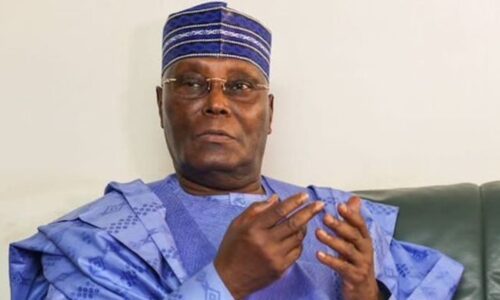By Hussaina Yakubu
Former Vice-President Atiku Abubakar and Africa’s richest man, Aliko Dangote, on Friday called for renewed Northern unity and policy consistency.
The duo also advocated the return to the region’s historic development priorities as the Arewa Consultative Forum (ACF) marked its 25th anniversary in Kaduna.
Speaking at the event, Abubakar congratulated the ACF for what he described as “shouldering the mantle of Northern leadership through the thick and thin” over the past quarter century, in spite of political shifts and socio economic pressures that had tested the organisation’s resilience.
He paid glowing tributes to the past ACF leaders who had passed on, saying their sacrifices helped anchor the North during periods of uncertainty.
“May God shower His mercies on them,” Abubukar prayed.
He said anniversaries such as the ACF’s were moments not only of celebration but serious reflection on the founding vision of organisations and their present relevance.
The former vice-president recalled that in 1999, the region was deeply fragmented along political tendencies, prompting efforts to rebuild cohesion.
Hr explained that he then convened a committee led by the Emir of Ilorin, Ibrahim Sulu-Gambari, to harmonise various Northern political blocs into a single platform.
The effort, he said, eventually birthed the ACF as a united regional voice under the leadership of former Head of State, retired Gen. Yakubu Gowon, and the late M.D. Yusufu, former Inspector-General of Police.
Abubakar said the formation of the ACF was aimed not only at unity but also at reviving the region’s core development agenda as articulated by the late Premier Sir Ahmadu Bello in the 1960s.
According to him, the original Northern priorities education, agriculture and industry remained relevant even in modern times.
He outlined initiatives undertaken under the National Development Programme (NDP) during his tenure, including the Northern Educational Project led by Prof. Adamu Baikie, which sought to rebuild schools, retrain teachers and restore dignity to the teaching profession.
Abubakar also highlighted the NDP’s agricultural reform efforts, which involved experts designing new policies to boost yields, strengthen value chains and integrate climate resilient strategies into farming.
Industrial mapping exercises, he said, revealed persistent obstacles such as energy shortages, financing challenges and multiple taxation.
Abubakar said that many of the impediments identified two decades ago had remained unresolved, warning that the region could not afford complacency if it hoped to unlock its dormant potential., urging, “we must not stagnate.”
Turning to the issue of unity, he said that the North’s major weakness had been its inability to properly manage diversity, in spite of examples of highly diverse countries like India and China that had leveraged pluralism for development.
Abubakar cited Ahmadu Bello’s famous statement that Northern strength lay in its diversity.
He cautioned against external forces seeking to sow division in the region through misinformation and fear mongering, adding that only a just and inclusive leadership could secure the North’s stability.
On the future, Abubukar raised concerns about demographic pressures, food insecurity, educational deficits and unemployment, warning that Nigeria’s projected population growth demanded urgent strategic planning.
The 21st century environment, he said, would not tolerate “absentee leadership or leadership without vision.”
In his remarks, Dangote echoed Atiku’s concerns, emphasising the need for deliberate policy frameworks to reposition the North economically.
He recounted past studies commissioned to understand the failure of industries and business leaders in the region, which revealed that policy inconsistency and inadequate electricity supply were the major constraints.
Dangote said those challenges persisted and continued to undermine industrial growth, saying that his companies avoided reliance on the national grid due to power instability.
“There is no way you can have growth without electricity,” he warned.
Dangote said industrialisation was essential but difficult under prevailing economic conditions, including high interest rates and inflation.
He urged Northern political leaders to craft new policies that would make education, industry and agriculture the pillars of development, insisting that the region had sufficient resources to lead West Africa in food production.
Dangote attributed rising insecurity and banditry partly to the failure to industrialise and modernise agriculture.
He said all leaders, himself included, shared responsibility for the region’s current challenges and must work collectively to reverse the trend.
“If we don’t resolve these issues, they will consume every one of us,” he said.
Both Abubakar and Dangote appealed to Northern elders, policymakers and stakeholders to recommit to the ideals of unity, purposeful leadership and socio economic transformation.

